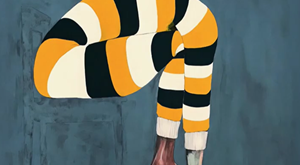I haven’t heard of Douglas Ray Jaffe before, but that doesn’t mean anything. The artistic world is impossibly large these days and few have time for traversing every avenue and thoroughfare. There’s too much to read, see, and hear to possibly cover all of it. His debut Douglas Ray Jaffe Project doesn’t deserve to get lost in the musical slush pile of indie and mainstream music glutting and inundating our culture. The sparkling musical qualities, depth of emotion, stylishness and melodic excellence of Jaffe’s work bodes well for his musical future. He’s made the transition from writer/raconteur/philosopher into musical artist without a hiccup.
URL: https://www.douglasrayjaffeproject.com/
Songs such as the EP’s opener “For Rachel” bear this out. Jaffe’s songwriting and the stellar instrumental playing naturally builds around adroit lyrical material. Nothing sounds forced. Elegant piano playing is the melodic core of “For Rachel”, but the song’s other adornments nicely complement Jaffe’s artistic vision.
His focus is a major component of his vision as well. “For Rachel” doesn’t waste listener’s time with a single extraneous note or word. However, it never sounds rushed. The opener develops at an agreeable pace and the payoff moments arrive when your listening instincts are expecting them. Jaffe’s EP continues along the same path for the second track. “Gullibility” highlights a wider range of Jaffe’s lyric writing strengths – nothing about the second track’s writing covers the ground traveled during the first cut. Yet an internal consistency sustains the songwriting.
He expands his songwriting into much more cinematic territory with this song. “For Rachel” trades on intimacy while “Gullibility” embraces a wider screen approach that couples acoustic and electric guitar into an inspired package. Grammy-nominated producer Craig Brandwein and Jaffe draft a sterling class of musicians to help flesh out the song’s potential and tackling unusual themes, reflected by the song’s title, is likely to become one of Jaffe’s characteristic attributes.
“One More Time” gives the EP some flash. I hear plenty of substance, as well, in this top shelf pop confection. The musical merits are evident from the start. “One More Time” catches your attention off the top with a spectacular bass line that represents one of the EP’s unquestionable highlights. Varying the lead vocal slot yet again doesn’t create a scattershot effect when hearing the EP in full.
Instead, you can marvel at the steadiness of Jaffe’s intentions. A common voice drives each of the EP’s three songs and his dazzling artistic dexterity allows him to consistently entertain listeners. “One More Time” is the final reminder of his facility. It’s one of the brightest pop moments included on Douglas Ray Jaffe Project and finishes off the release on an invigorating note.
Debuts from essentially musical newcomers are sometimes tentative. Not the case with Douglas Ray Jaffe’s work. Brandwein’s production acumen frames the author’s lyrical gifts with urgent, contemporary arrangements that never run too long. The three songs written and recorded for Douglas Ray Jaffe Project are deeply fulfilling and I’ll be back for more. You should follow my example.
Mark Druery
 IndieShark Music News, Reviews & Interviews
IndieShark Music News, Reviews & Interviews



